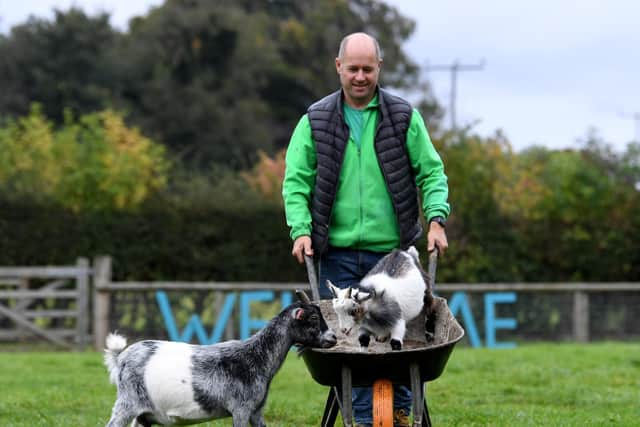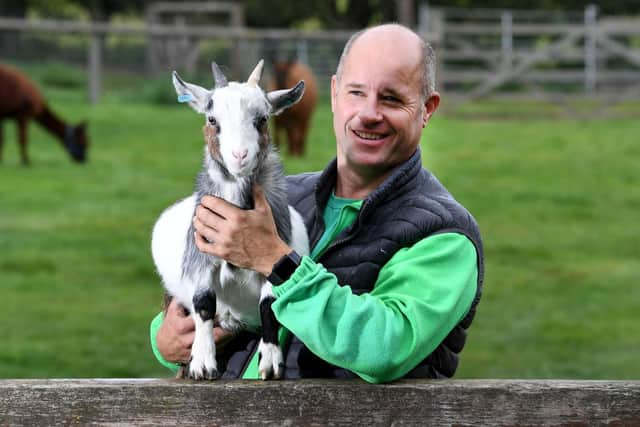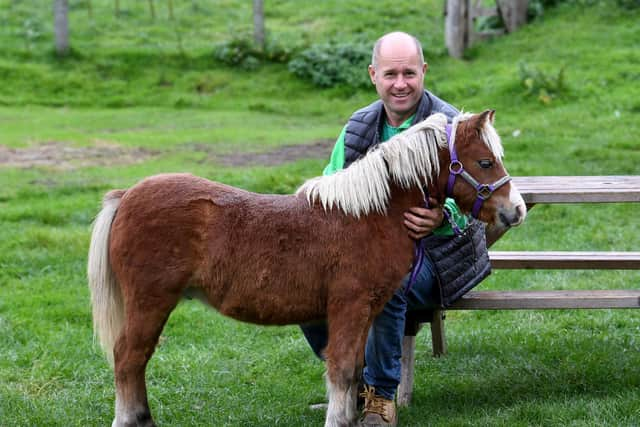Ian's Mobile Farm: The Yorkshire couple who rescued goats and a pig from a council house - and now have a 'Noah's Ark' business
Ian’s Mobile Farm owner Ian Prentice enjoys teaching children about agriculture. His Aberford enterprise opens for special visits from pupils who are eager to learn about life on the farm, and he takes animals into schools for tailorored sessions.
He said: “We introduce children to a large selection of friendly, well cared for animals. We attend large events and shows all over the UK with our extremely popular farm, with optional extras such as battery tractors and a bouncy castle.”


Advertisement
Hide AdAdvertisement
Hide AdHis farm is home to hundreds of animals, many of which have been rescued and rehomed, and there is even a model cow which children can milk.
New arrival Frankie, a miniature American horse, is settling in to his new home before being slowly introduced to other animals and visitors.
Meanwhile, Mr Prentice is planning to stage a Halloween event and a festive farm featuring Santa’s workshop and a village scene with a sleigh, festive lighting and music.
Ian and his wife Carol first began collecting their 'Noah's ark' after rescuing two goats and a pig from a council house in Wakefield.


Advertisement
Hide AdAdvertisement
Hide AdThe couple live at North Cottage on what was formerly part of Hicklam Mill Farm in Aberford.
Ian originally ran a landscaping business, and bought the property after moving from Bardsey in 1999 for the extra space. Now their menagerie has grown to over 120 animals and they have opened a small caravan and camping site.
Their travelling retinue includes alpacas, sheep, goats, donkeys, Shetland ponies, rabbits, guinea pigs, chickens and ducks.
“It’s hard work and a long day for each one. It takes an hour to get all the animals loaded, then there’s the travel time, another hour to set everything up including the pens, fencing and banners. We run the displays as 45-minute sessions for Key Stage One children. We give them a short introduction to where we live and a bit of background about us. I’ve become known as Farmer Ian to them.


Advertisement
Hide AdAdvertisement
Hide Ad“The rabbits come next and we encourage them to feel the fur, followed by guinea pigs so that they can compare them to the rabbits. They get to stroke or touch everything live apart from the alpacas. We had the alpacas sheared last year so we take out a bag of their fleece and the yarn. We also show them a scarf knitted out if it. Children don’t know that’s how scarves are made so it’s a big eye opener.
“People can’t believe it when they see it all set out and then realise we’ve got there with everything in one trailer, but the fencing goes on the trailer roof. We have a special Defra licence for moving and showing everything.”
The mobile farm might never have come about if they had moved as they were thinking about a few years ago.
“We were considering buying a caravan park in Whitby,” says Carol. “We went to view it in really bad weather. When we quizzed why the owners were selling they mentioned that they were looking to buy a certified site. We didn’t know what that meant so we checked it out on the internet saw that it was something for five caravans and 10 tents and thought it would be ideal for us here, within a couple of hours we had applied for permission.
Advertisement
Hide AdAdvertisement
Hide Ad“When we first had someone out to see if it would work one industry professional told us that he didn’t think our site would be popular as we’re so close to the A1(M), but he could see people using it as a stopping off point on the way to other places. We were fine with that but what we’ve found is that most of our regulars are people with young children from the West Riding who keep coming back because of all the animals we have.”
The original rescue goats were quickly followed by the purchase of more pygmy goats that are still amongst Carol’s favourites.
“Pygmy goats have their own personality and cause chaos in the nicest sense of the word. Ian bought me Sally and George (pygmy goats) for my birthday one year and we ended up buying more. We now have 18 and some angora goats and boa goats. We sell the goats’ kids to other smallholders.
“Donkeys came next as we took on some that were in need of a new home that were in a bad state. Then Ian was on the internet looking for a shelter for them when he turned to me and said how did I feel about alpacas? It’s all grown from there.”
Advertisement
Hide AdAdvertisement
Hide AdIan has been a landscape gardener since leaving school and worked at Harewood House.
Carol, who hails from Batley, works in health and safety for the construction industry. They have a daughter, Beth, who is their assistant at some of the events they attend.
“Beth classes the rabbits as her own pets and she shows people how to pick them up if they’re doing it wrong.
“We’re not proper farmers and we’re probably frowned on by some who are, but we are giving children an opportunity to learn about all kinds of animals.”
For more information about Ian’s Mobile Farm, visit www.iansmobilefarm.co.uk
